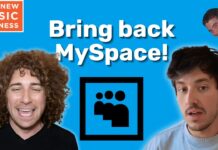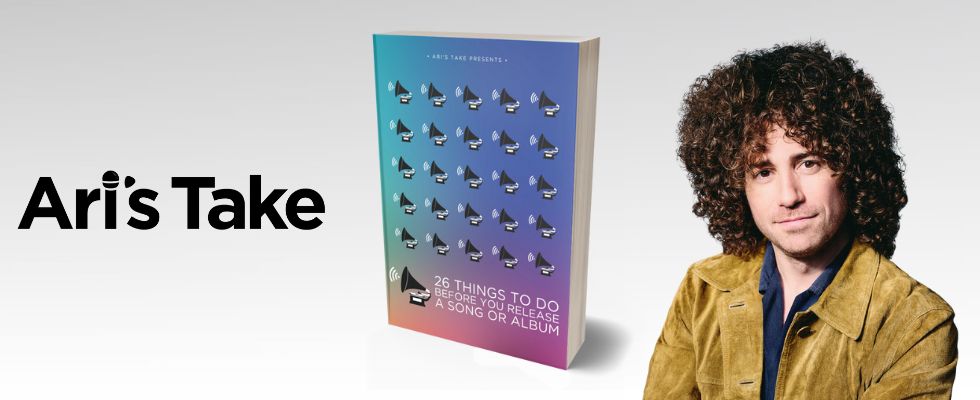First off, if you’d like to listen to my interview with the MLC’s CEO, Kris Ahrend, where he breaks down the nitty gritty of the MLC (in his words) and we dig into their Public Search and find errors in their database which I call him on (in real time) oh it’s fun, watch the video above, or listen on your favorite podcasting app: Apple, Spotify, Acast, Stitcher, etc.
The Mechanical Licensing Collective (MLC) came out of the Music Modernization Act (MMA).
Wow there were a lot of buzz words and phrases you may have never heard of in that first sentence.
To not get into the weeds of how all this went down, basically, if you remember all the lawsuits filed against Spotify a few years back from songwriters? Well, the MLC was created (in part) so all the streaming services stopped getting sued and so songwriters could get the money owed to them a lot easier.
The DSPs (streaming services) didn’t know who to pay all of this money to, so they’ve been holding onto it. Now that the MLC has officially gone into effect, the DSPs dumped all of this unclaimed money into the MLC.
The biggest contributors of the unclaimed, “historic” money, are:
Apple: $163 million
Spotify: $153 million
Amazon Music: $42 million
Google/YouTube: $32 million
All in all, it’s just over $400 million of unclaimed money.
+Songwriters Just Got a Raise, How To Get Your Money
What is the MLC in Music?
The MLC is the organization setup by the US government (after the MMA was signed into law) and went into operation January 1st, 2021. It collects mechanical royalties from DSPs (streaming services) and distributes them to songwriters (and publishers).
Stay with me! I know there were a lot of scary words in this sentence. I’m going to break this down very, very plainly. Spend the next 5 minutes with me and you’ll walk away an expert (and hopefully much richer).
Before we get too far into this, this really only concerns US songwriters.
If you are a songwriter in a country that’s not the US, well, this article doesn’t really concern you. Your local Mechanical Rights Organization (MRO) has a deal with the MLC, and you can sign up with them to get your US mechanical royalties. In the UK, this is MCPS. In Canada there are two: CMRAA or SOCAN; AMCOS in Australia; SACM in Mexico. Most countries have an MRO or Collective Management Organization (CMO) that handles this. And they all have deals with the MLC.
Worth noting, the MLC will PAY these international CMOs, but the international CMOs will NOT pay the MLC. Why? Because the drafters of this law wanted to make life difficult. More on this below.
Here are some of the CMOs around the world handling mechanical rights (more coming soon!):
Australia – AMCOS
Austria – AUSTRO-MECHANA
Belgium – SABAM
Brazil – UBC
France – SACEM
Germany – GEMA
Mexico – SACM
Netherlands – STEMRA
Hong Kong – CASH
Ireland – MCPS (Ireland)
Italy – SIAE
Japan – JASRAC
Portugal – SPA
Russia – RAO
Scandinavia – NCB
South Africa – CAPASSO
Spain – SGAE
Switzerland – SUISA
UK – MCPS (part of PRS for Music)
There are two kinds of songwriter royalties earned from streams: performance royalties and mechanical royalties.
What Are Performance Royalties?
Performance royalties are earned whenever your song is “publicly performed” on TV (like in a TV show or commercial), in a grocery store over the loudspeaker, by you at a concert in a music venue, or anywhere else in public where the establishment has a “public performance license.” These licenses are negotiated and obtained by the Performing Rights Organizations (PROs). In the states, the big ones are ASCAP, BMI, SESAC. There are a couple others, but if you’re reading this, these are the ones that concern you most likely.
Performance royalties, again, are also earned when your song is streamed on DSPs.
All the DSPs (like Apple Music, Spotify, Google, YouTube, Amazon, Deezer, Tidal, etc) have licenses with the PROs.
What Are Mechanical Royalties?
Now, mechanical royalties are only earned from streams (and sales) of recorded music for songwriters/publishers.
About half of all songwriter royalties from streams are mechanical royalties.
So, if you are only signed up with a PRO (like ASCAP or BMI) you’re actually missing out on half of your money!
What Are The Royalties From My Distributor?
So, when you distribute your song through DistroKid, CD Baby, TuneCore, UnitedMasters, Stem, AWAL, Symphonic, Songtradr, or any of the other ones out there, the royalties they collect and pay you are only for the sound recording (some call this the “master”). So, you, the artist, distribute a recording and all the money your distributor pays you is the revenue earned for the recording.

If you release a cover song, you’re going to get paid the same amount from your distributor as if you release an original song.
+How To Legally Release Cover Songs
Why? Because your distributor only collects on the recording. The DSPs (streaming services) pay all the songwriter royalties to publishing companies, performing rights organizations and the catchall term CMOs (Collective Management Organizations).
Pop quiz hot shot: how many songwriter royalties are there earned from streams? (hint, the answer is like two feet up this page).
So, since there are both Performance Royalties and Mechanical Royalties earned for songwriters from streams, HOW DO YOU GET THEM???
Well the easiest way to get these royalties is via a publishing company (or admin publishing company like Songtrust or Sentric or TuneCore Publishing or CD Baby Pro publishing).
If you have an admin publishing company you do NOT need to sign up for the MLC.
I probably should have opened with that, huh?
Again, if you have a publishing company, they will collect all your songwriter royalties from all the DSPs around the world. But, they’ll also take a commission.
Here’s the deal, if most of your streams come from the US, you could sign up for a PRO (ASCAP, BMI, SESAC) and the MLC and you’ll be mostly set.
HOWEVER, you’ll be missing out on all your international mechanical royalties.
Again, MLC doesn’t (currently) have a reciprocal deal with other CMOs in other countries. Meaning they don’t collect your international mechanicals!
Personally, my songs are registered with Songtrust. I’m happy to give them 15% commission so I don’t have to deal with the headache. I register my songs there, once, and they get them registered in all 60 or so societies around the world (including the MLC and ASCAP).
But, Songtrust costs $100 to enroll (well, $80 if you use the code ARISTAKE) and they take 15%. So, unless you’re getting millions of streams, it may not actually be worth it. Because mechanical royalties are like 1/10 of what you earn from your distributor for your recordings.
What Commission Does the MLC Take
So, unlike the PROs, the MLC takes 0% commission! Huh? How?! Well, part of the MMA law stated that the DSPs actually have to cover ALL operating costs of the MLC. The PROs skim off about 12% or so to run their business. But the MLC passes through 100% to you. And it’s free to join.
Where Does Harry Fox Agency or Music Reports play into this?
Ok smarty pants! So you know about Harry Fox Agency (HFA) and Music Reports Inc (MRI) eh? Yes, these orgs used to administer and handle mechanical rights in the US. Yes, they USED DO issue licenses and collect mechanical royalties from the DSPs.
But they don’t anymore!
The MLC is now the only organization in the US (designated by law) to collect and distribute mechanical royalties.
HFA and MRI still exist and they are still in the music rights management business, but they no longer handle mechanicals for DSPs.
Insider baseball: Harry Fox Agency actually compiled the database for the MLC (yes they got paid HANDSOMELY for it – so they’re doing aight).
How Long Do You Have To Get Your Money
Here’s the bad news: the law also states that the MLC only has to hold onto unclaimed royalties for 3 years, then it will distribute them to its current members based on market share. So, if you don’t claim your money, Sony/ATV, Warner Chapel, Universal Music Publishing Group and the others will get your money. And believe me, they are HOPING the indie songwriters out there don’t claim this $423 million so they get a massive pay day.
Even more bad news: they can actually start paying this money out in 2023 (for the “historically unmatched royalties”). So, as of today songwriters (may) only have 2 YEARS to collect!
So go get your money!
If you don’t want to sign up for an admin publishing company, no worries.
Head on over to the MLC’s website and click the Connect to Collect button at the top and go through the prompts. It’s free to join.
How To Know If You Have Unclaimed Royalties Or Not?
Also, as of today, there’s no way to search to see if you have any unclaimed or unmatched royalties. I did a search and all my songs that are registered with ASCAP (even unreleased songs) came up. Are these “matched” or “unmatched,” paid or unpaid? No idea. Kris told me that their database was compiled by Harry Fox Agency. How did they compile it? We aren’t sure yet.
This database has lots of words, but says nothing of value at the moment. I don’t know if I’ve been paid on these songs or not. The MLC told me that this will be worked out soon. Fingers crossed!
As you heard in my conversation with Kris, their database is not perfect. I already found some errors. And discovered that some of my mechanical royalties are being paid to the WRONG PUBLISHER! And some of my co-writes, only 50% of the money is being paid out – because my co-writer doesn’t have anyone collecting her mechanicals. Time to sign up with the MLC Nina!
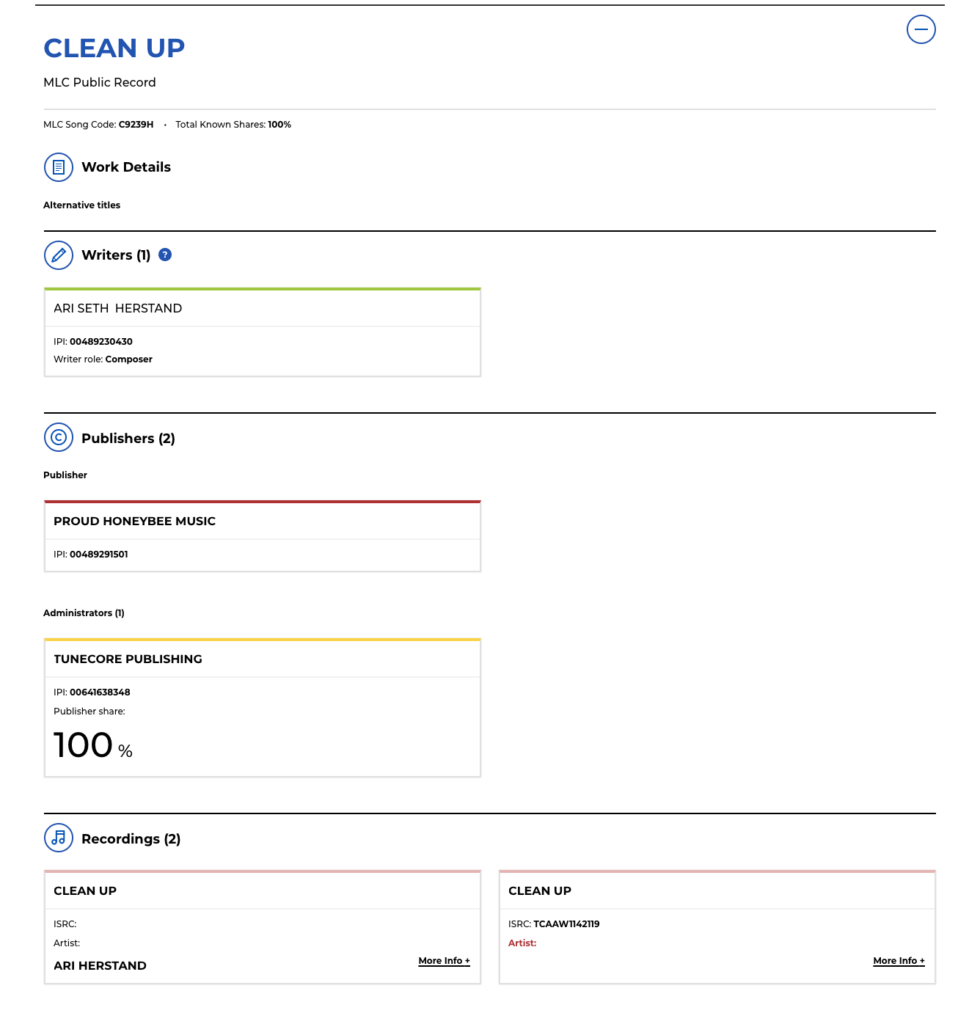
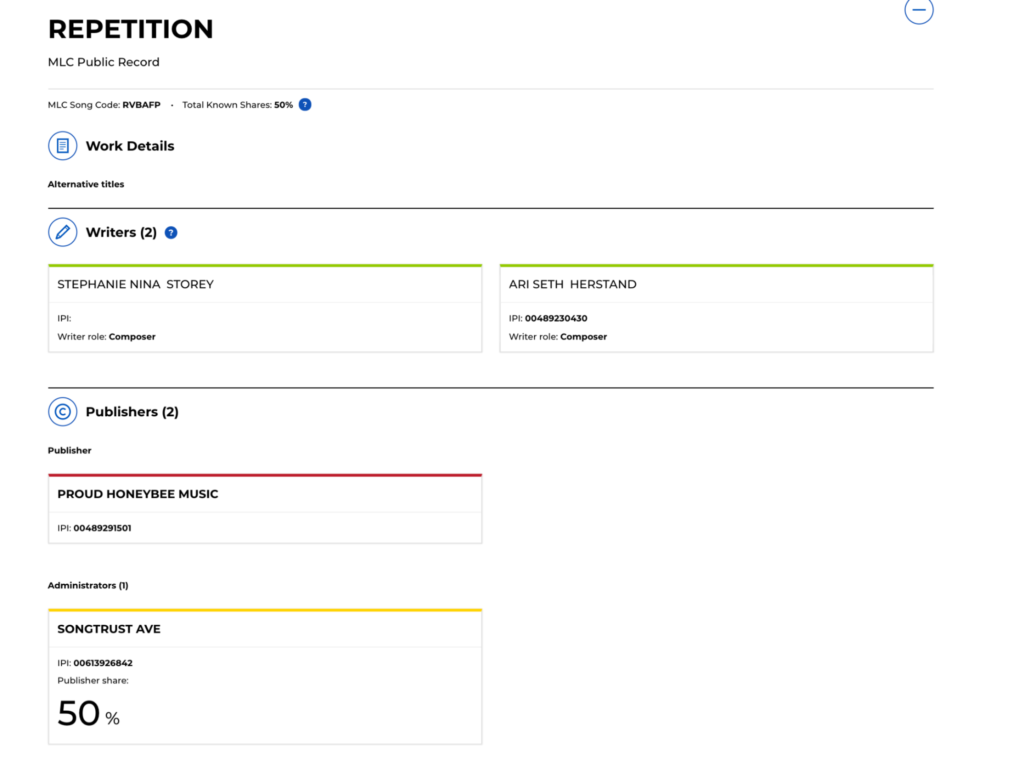
Oh and another frustrating thing, I noticed that another co-writer of mine, Brett, registered some of our songs (he also uses Songtrust) with my artist name “Ari Herstand” and NOT my songwriter name “Ari Seth Herstand” and IPI number, so this stuff is all jumbled here as well.
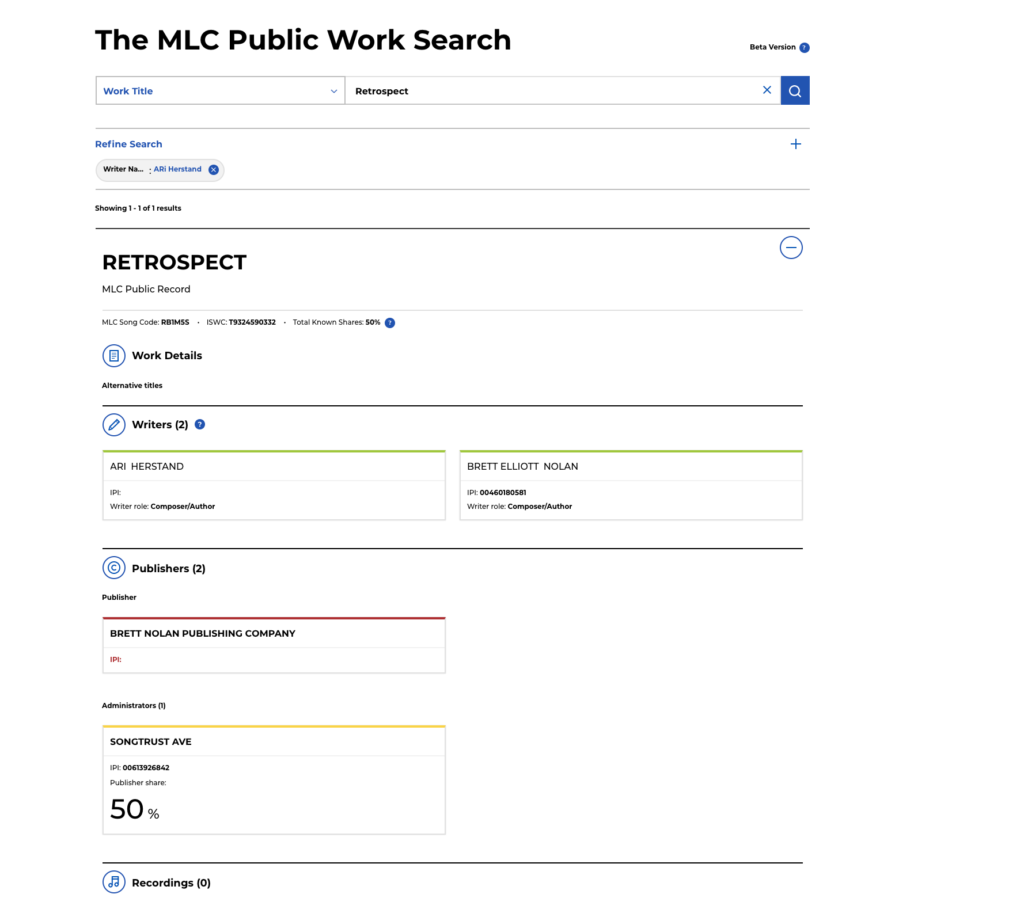
Any questions? Hit me in the comments and I’ll try to answer them.








